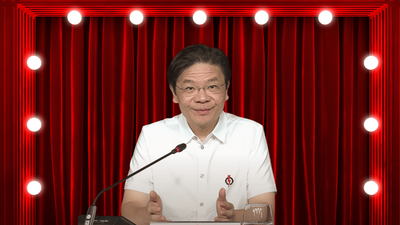Public concerns over the Ridout Road bungalow leases by Home Affairs and Law Minister K Shanmugam and Foreign Affairs Minister Vivian Balakrishnan present one of the biggest political challenges for the government in recent times. The findings of the ministerial review, led by Senior Minister Teo Chee Hean, and the Corrupt Practices Investigation Bureau (CPIB) will be discussed in Parliament next week. How might any fair-minded citizen, regardless of political sympathies, objectively assess the findings?
There are two key issues that must be addressed. First, whether there has been any actual wrongdoing by either minister. Second, and equally important, is whether these transactions breached the Code of Conduct for Ministers (Code), which stipulates that ministers must scrupulously avoid any actual or apparent conflict of interest and must never enter transactions which might, even conceivably, come into conflict with their public duties.
Was there actual wrongdoing? The CPIB report found no evidence of corruption or criminal wrongdoing in the two rental transactions; no corrupt intent on the part of any person, or any inducement given to any individual involved in processing the rentals; no preferential treatment; no disclosure of privileged information; and no evidence to suggest any abuse of position by the ministers.
SM Teo’s report, in turn, concluded that both ministers conducted themselves properly in the rental transactions, and in particular found no breach of the Code. In the case of Mr Shanmugam, SM Teo found that the minister “recognised the potential conflict of interest, duly declared it to [SM Teo], and [had] taken effective steps to eliminate this potential conflict and to prevent any actual conflict from arising.” In the case of Mr Balakrishnan, SM Teo’s report found no issue of conflict arose “because Mr Balakrishnan’s official responsibilities did not include the SLA [Singapore Land Authority]”.
Three broad observations may be made.
First, the CPIB’s conclusion on the issue of criminal wrongdoing appears sound. The threshold to find criminal wrongdoing or corrupt intent is a very high one and cannot be established in the absence of strong, compelling evidence. There is also no evidence to suggest any fundamental flaw in the CPIB’s investigation process.
The same, however, cannot be said of the process in the separate review conducted by SM Teo.
Second, possibly the most serious shortcoming of the ministerial review led by SM Teo is its perceived lack of independence. Among other things, it has now surfaced that SM Teo was personally involved in a key aspect of the events under review.
As explained in my earlier commentary, “Strengthening the Singapore system: the Ridout saga and conflicts of interest”, the overall credibility and effectiveness of the ministerial review in this case are weakened by the fact that the reviewer, SM Teo, is a cabinet and party colleague of the ministers involved. A greater degree of separation between the reviewer and the ministers under scrutiny would have increased the review’s credibility. There is no lack of such candidates, including many retired Supreme Court judges, who could have admirably undertaken the task.
Significantly, the CPIB report now discloses a further personal involvement by SM Teo in the matter under review: in recusing himself from any discussion on the rental of his property, Mr Shanmugam had informed SM Teo that should matters arise in relation to his intended lease that had to go beyond Minister Indranee Rajah, she would approach SM Teo. While no such issue arose, the unavoidable result is that SM Teo knew of these arrangements, was directly and personally embedded within the relevant chain and implicitly, if not explicitly, approved of the very process whose legitimacy he was later tasked with reviewing.
In these circumstances, SM Teo ought to have recused himself from the review, much less lead it, since the review would inevitably touch on the legitimacy and robustness of the very process that involved himself. If this were a commercial dispute, internationally accepted rules on appearance of bias would have disqualified SM Teo from acting as an arbitrator in the matter, and any findings made by a tribunal led by him would have been liable to be set aside by a court of law.
Nor is this fundamental shortcoming in the ministerial review process saved by the fact that SM Teo’s review had relied on the CPIB’s related investigation findings. CPIB’s remit was much narrower than the ministerial review. It sought to determine “if there was any corruption or criminal wrongdoing” in relation to the two leases. The ministerial review, on the other hand, necessarily involved going beyond this narrow scope to consider, among other things, questions of ethics, proper governance and possible breaches of the Code.
The principles at stake in the Ridout ministerial review go far beyond narrow, commercial considerations. They involve the propriety of ministerial conduct and compliance with ethical and governance standards under a strict Code which has been in place since 1954. In this case, the absence of an independent process in the separate ministerial review undermines the validity of the conclusions in SM Teo’s report. It is worth noting that the UK Ministerial Code provides for such investigations to be conducted by the (non-political) Cabinet Office or an Independent Adviser.
Third, this fundamental flaw in the ministerial review process has been compounded by what also appears to be its failure to robustly consider the strict language of the Code and the exacting standards it imposes on ministers. One of the most important questions for the ministerial review would have been to determine if either of the two ministers had breached the Code. This is where the ministerial review appears to have been less than robust. To appreciate this point, some context is necessary.
The Code details how ministers should conduct themselves in areas such as possible conflicts of interest and in their dealings with (non-political) civil servants. The Code is concerned just as much with avoiding possible public perceptions of ministerial misconduct as with actual wrongdoing.
The Code makes it clear that it is “not exhaustive” and that “Hence, a Minister should carefully avoid all transactions that can give the impression that he may be doing anything which this Code of Conduct forbids.” (These and subsequent emphases are mine.) What is forbidden?
- Clause 3.1 states that “A Minister must scrupulously avoid any actual or apparent conflicts of interest between his office and his private financial interests.”
- Clauses 3.1(a) and (b) then explain that a conflict of interest, or a perception of conflict, can arise from the exercise of powers or influence in a way that benefits or may be seen to benefit private interests. Such perceptions of conflict can also arise from using special knowledge acquired in the course of activities as minister to benefit his private financial interests (or which could arouse suspicion of this). These are non-exhaustive examples.
- With this in mind, clause 3.2 then unequivocally states that “A Minister, therefore, must never enter into any transactions whereby his private financial interest might, even conceivably, come into conflict with his public duty.”
- Additionally, the Code states that a minister must not request a civil servant to do anything that may conflict with the Civil Service’s core values, one of which is the principle of impartiality.
There can be no doubt that the Code is concerned just as much with perceptions of ministerial wrongdoing as with actual wrongdoing. Not only must a minister avoid apparent conflicts, but he must also do so “scrupulously”. The bar against transactions which might “even conceivably” come into conflict with his public duty is complete—a Minister “must never enter any (such) transactions”. The prohibitions are absolute.
The Code’s objective is clear—so long as a transaction involving a minister can conceivably create the perception of conflict of interest, it must be scrupulously avoided. Obviously, the Code’s framers believed that that is the only way to preserve unquestioned integrity and confidence in the political leadership and place their conduct beyond reproach. While other nations set their own (different) boundaries for ministerial conduct, we in Singapore have set this exacting standard for our ministers for well over half a century.
While SM Teo’s review dealt with the question whether there was an actual or potential conflict of interest and how that was avoided, it does not appear to have considered whether the totality of the circumstances could conceivably have created perceptions of conflict of interest or preferential treatment.
The review found that because Mr Shanmugam had removed himself from the chain of command and decision-making process for his lease, the minister had taken “effective steps to eliminate this potential conflict and to prevent any actual conflict from arising”. But this assessment is incomplete. It does not appear to consider the full language of clause 3 of the Code nor whether the totality of the circumstances might conceivably have placed the minister’s private interests in conflict with his public duties, or aroused suspicion of this.
Given the very wide cautions in the Code, it is entirely legitimate to have expected the ministerial review to pursue some, if not all, the lines of inquiry below and clearly report if one or more of them might have aroused adverse perceptions of conflict of interest or preferential treatment.
- Whether the fact that Mr Shanmugam, at all times, as the minister in charge of SLA, whose officers were ultimately answerable to him on all other matters, might have created an apparent conflict of interest even if the minister removed himself from the chain of command and decision-making at some point?
- Whether Mr Shanmugam’s request to the then Deputy Secretary of the Ministry of Law (DS/MinLaw) for a list of possible rental properties was made to further a public function, or informed by his personal interest in renting one such property? SM Teo’s report does not explain this. If the request was not made in the discharge of the minister’s public function, might that have placed DS/MinLaw in conflict with the Civil Service’s core value of impartiality? Would a very senior civil servant such as the DS/MinLaw have personally attended to a similar request from the public?
- What was the context for the site visit to 26 Ridout Road? Was it a routine visit done by the Minister as part of his discharge of public functions or informed by a personal intention to rent the property? What was the SLA’s view when informed of Mr Shanmugam’s opinion that he was not confident that the adjacent land would be maintained in a way that would keep 26 Ridout Road free of health and safety issues—did the SLA approach this as feedback from the Minister or a potential tenant? Did the SLA think that was a legitimate view? If not, was there any pushback from the SLA on this? If there was no pushback, why not?
- Apart from what appears to be a S$2,000 per month increase in the rent of 26 Ridout Road on account of the amortised costs of the S$172,000 incurred by the SLA for the site clearance, replanting of greenery and fencing for the extended boundary, was there a separate component of the rent which was increased to account for the very substantial expansion in the land size of 26 Ridout Road from 9,350 sqm to 23,164 sqm? (The extra land is equivalent to around two football pitches; the whole site, three.) If so, how much was that component and was it reasonably derived? If not, shouldn’t a tenant’s access to a much larger piece of cleared land have led to an appropriate increase in the rent? Might a failure to do so create adverse perceptions of preferential treatment?
- When exactly did Mr Shanmugam inform the then DS/MinLaw that he would recuse himself from any discussion relating to 26 Ridout Road? Was this before or after the site visit? Would a recusal at that stage have eliminated any risk of perception of preferential consideration by SLA of the minister’s bid for the property?
- Annex E-1 to the review report compares the rentals of 26 and 31 Ridout Road with other black and white bungalows in the Ridout estate on a “rent per unit floor area” basis to determine if either minister received preferential treatment in their rentals. But should an additional comparison also have been made of the rentals based on a total land area basis of the various bungalows? Would the public not reasonably expect that a much larger property warrants a corresponding increase in the rental on a total land area basis?
- Was Mr Shanmugam also removed wholly from any chain of command or involvement in SLA’s statement of May 12th 2023 which incorrectly stated that the rent offer for 26 Ridout Road was above the Guide Rent?
Given these shortcomings in both the process as well as the failure to fully consider the issue of apparent conflict under the Code, the soundness of the conclusions in SM Teo’s report is affected.
Does the evidence disclose a breach of the Ministerial Code? Let’s start with the lease at 26 Ridout Road. As I said in my earlier commentary, the optics of a minister entering a substantial property transaction with an agency under his oversight are less than favourable. That transaction appears to fall foul of the high standards under clauses 3.1 and 3.2 of the Code.
On the face of it, the minister’s private interest as tenant of the lease gives rise to an apparent conflict of interest with his public duties as minister in overall charge of the SLA, the landlord of the property. At minimum, the minister’s private interest in the lease might conceivably come into conflict with his public duty as the minister overseeing the very agency involved in reviewing and assessing his bid and granting the lease. This is so even if the minister recused himself in the SLA’s deliberations over the lease. The transaction directly pits the minister’s private interest as tenant of 26 Ridout Road with his ultimate public duty to advance the SLA’s interests as landlord of the same property. The two interests are directly opposed.
This risk of a perception of conflict is enhanced when one adds to the mix the minister’s personal request to DS/MinLaw for the list of available rental properties; the circumstances under which the very substantial adjacent land came to be cleared and added to the boundary of 26 Ridout Road; and what appears to be zero uplift to the rental for 26 Ridout Road despite the very significant increase in the land area from 9,350 sqm to 23,164 sqm.
What then of the lease at 31 Ridout Road in favour of Mr Balakrishnan? Here, the position appears to be qualitatively different. The SLA is not an agency under the minister’s portfolio and does not report to him. The nature and functions of the SLA also mean that it is highly unlikely that there is any overlap in its functions and responsibilities and the duties of the Foreign Affairs Minister such that he could have benefited from special knowledge acquired by way of his position.
The question, of course, is whether the circumstances can fairly and legitimately be said to “arouse suspicion” under clause 3.1(b) of the Code that, in securing the lease of 31 Ridout Road, the minister had used special knowledge acquired in the course of his activities as minister to benefit himself. There is no evidence presently available of this and it would be impermissible to come to this conclusion.
Hence, in the case of the lease at 31 Ridout Road, there does not appear to be a breach of the Code.
Concluding Observations. First, given the importance of the issue, the government should clearly state whether, going forward, it is maintaining the strict prohibitions in clauses 3.1 and 3.2 of the Code. If the current strictures in the Code are being loosened, the government should explain why strict standards which have been in place for decades are being adjusted.
Second, if it is felt that fresh mechanisms should be put in place to address potential ministerial conflicts, then serious thought should be given by the government to adopt the UK model, of appointing an Independent Adviser, both to independently advise on issues arising in adhering to the Code and to investigate any possible breaches. This will avoid the shortcomings highlighted in the Ridout ministerial review process.
However minor, doubts that strike at the foundation of our commitment to incorruptibility and the rule of law must never be allowed to take root. Occasions such as the present offer an important opportunity to reaffirm these commitments.
Harpreet Singh Nehal is a Senior Counsel. A graduate of National University of Singapore, Harvard Law School and a former Justices’ Law Clerk, he was previously a partner of Drew & Napier and later of the UK Magic Circle law firm, Clifford Chance. In 2019, he established his own boutique litigation firm, Audent Chambers, where he is managing partner. He is also a member of Harvard Law School’s Leadership Council of Asia.
If you enjoy Jom’s work, do get a paid subscription today to support independent journalism in Singapore.
Letters in response to this piece can be sent to sudhir@jom.media. All will be considered for publication on our “Letters to the editor” page.







